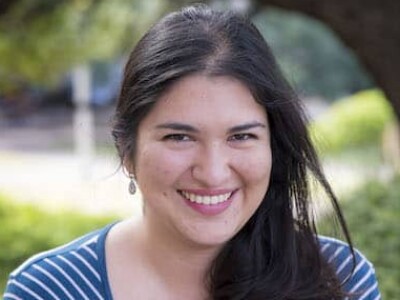Monique Vasquez, MSSW ‘18
Hometown: Tucson, Arizona. That’s where I did high school and college.
Why social work: I was working as a mental health case manager in Arizona, and I kept seeing that my clients would run into systemic barriers. I was getting frustrated because I felt like I could only do so much. I knew I wanted to go back to school. One of the therapists at my office, who was such a kind person, talked with me about social work and that’s how I got to learn about the field. I’m doing the dual degree with social work and public health. I had finished the Peace Corps in Madagascar and loved my experience, and I’ve been thinking about public health since then. I was also interested in integrated behavioral health at the time, so I knew I wanted to do something that includes public health and social work.
Favorite experience at UT Austin: The possibility for interdisciplinary work. I’ve worked part-time at the Dell Medical School for two years. They wanted a social work student to help with a UT System’s project assessment. They had us look at the scope of health in Austin and the surrounding five-county area. There’s been a lot of opportunities to do this kind of interdisciplinary work with anthropologists, social workers, medical doctors, and nurses. The other thing is being able to get connected to ongoing events. Professor Michelle Rountree has told me about things going on in the community, and I get to go to those and understand what I’ve learned in the classroom and see that in the actual community.
Most challenging time on the Forty Acres: One of the challenges I’ve had is navigating the social work and public health program at the same time. It requires a lot of your own coordinating. That said, I got to go to Oaxaca in Mexico, where I had this wonderful public health and social work experience to look at health disparities in the region. The other challenge is that once you get to learn about of all these issues going on, you get to better understand about disparities in Austin. It’s really hard to just sit in the classroom and not just be like, “I want to be done! I want to be out there doing things!” It’s hard to remind yourself that realistically, there’s not enough time to do everything.
Best social work internship moment: I was at Migrant Clinicians Network and Volunteer Healthcare Clinic, in both places I referred patients to care. What I liked about both roles was that it was a chance to work with Latinos in different ways. Volunteer Healthcare Clinic pushed me to work on my Spanish fluency. I felt like I was really having an impact one time when a client came in very agitated. He just talked to me and expressed his frustration about social work services, and I mostly listened to him. He said he felt better after talking about his stresses, and then I referred him to resources at the clinic and helped sign him up for those. At Migrant Clinicians Network, I led a presentation about training I had attended, “Undoing Racism.” I facilitated a discussion about systemic racism with the case managers, and the CEO was present as well. It was a really rich discussion, and it was exciting to lead that talk with them.
Favorite professor: Professor Michele Rountree has been hands-down one of my favorite professors. I talked to her before I even started classes here, and she’s been an amazing support. Professor Mitch Sudolsky gave many innovative talks, and really challenged me to think through my own biases and assumptions. He was one of my faculty supervisors. Miguel Ferguson isn’t here anymore, but he led a great program where we did a book review and then sent it to folks in a correctional facility. They would write back to us, and it was really cool to have a book conversation with them. Barbara Anderson, who just retired, has also been a great support resource for me. Jennifer Luna Jackson, the director of career services has helped me and has been really compassionate and helpful over the years. Ramón Gómez has been amazing, too. I’ve always been able to go to him whenever I feel upset. And I don’t think I could have navigated this program without Marian Mahaffey’s help.
On graduation: I’ll be attending the social work graduation because unfortunately, there isn’t a Latinx graduation for the fall. But I’m going to borrow the Latinx shawl from a friend and wear it during the social work ceremony. The public health program also doesn’t have a ceremony until May.
Plans for the future: I plan to stay in Austin. I’m applying for a couple of positions focused on health equity.
Words of wisdom for the incoming class: Take advantages of opportunities as they come. Really examine if what comes up is what you want to do ad what you want to invest your time in. Be selective, but take advantage of opportunities.
Posted December 5, 2018.


